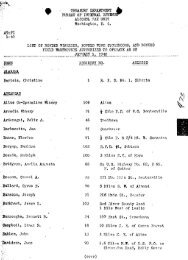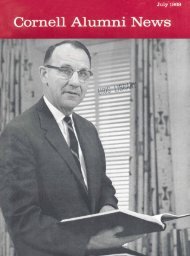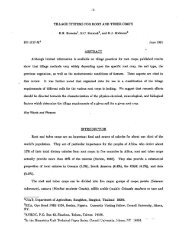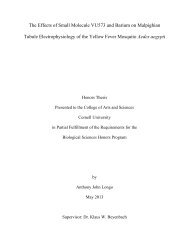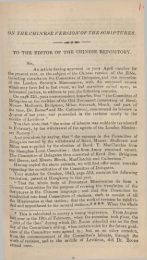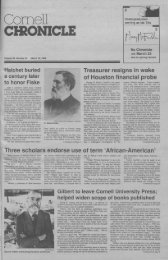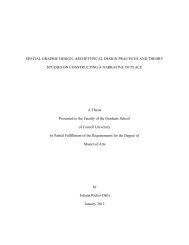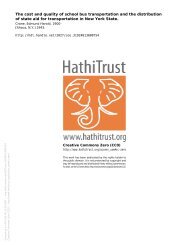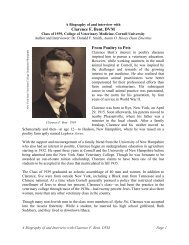1/1 - eCommons@Cornell - Cornell University
1/1 - eCommons@Cornell - Cornell University
1/1 - eCommons@Cornell - Cornell University
- No tags were found...
Create successful ePaper yourself
Turn your PDF publications into a flip-book with our unique Google optimized e-Paper software.
OF WHAT WE<br />
his office represent the moral conscience<br />
of our government," Elan<br />
Steinberg, executive director of the<br />
New York-based World Jewish Congress,<br />
said in an interview before<br />
Sher left for AIPAC. "It goes beyond<br />
the professional work that he does,<br />
which can only be described as impeccable.<br />
It's the historical import for<br />
our country, and as a symbol for other<br />
countries, that sets apart the work<br />
he does for that office."<br />
But the nature of his work provided<br />
Sher a dose of notoriety as<br />
well. Austrian newspaper cartoons<br />
mocked him as the "Waldheim<br />
Hunter." Various American ethnic<br />
groups have complained to Congress<br />
and successive presidential<br />
administrations about the OSΓs<br />
work. And political commentators<br />
William F. Buckley and Patrick<br />
Buchanan have rushed to the defense<br />
of some of those targeted by<br />
the OSI: Buckley called the deportation<br />
of one war criminal "judicially<br />
revolting."<br />
In a series of interviews before<br />
and after leaving the OSI, Sher<br />
brushes off complaints about the<br />
way his office hunts down elderly<br />
U.S. residents, who invariably, it<br />
seems, have led picture-perfect lives<br />
as law-abiding Americans. He is not<br />
fazed by comments like the one<br />
from Sergis Hutyrczyk's neighbor,<br />
who said he hoped the security<br />
guard would not be deported,<br />
because "he's a hard-working<br />
man."<br />
"It's a matter of, in many respects,<br />
the pursuit of justice in a<br />
very pure sense," Sher explains.<br />
"This is a country that was built by<br />
immigrants, people who were fleeing<br />
the persecutor. The idea that we<br />
have living in our midst the very<br />
persecutors, the criminals—it just<br />
goes against everything this country<br />
stands for."<br />
Typically, complaints about OSI<br />
focus on the extraordinary, multinational<br />
legal proceedings in which<br />
American defendants are confronted<br />
with documents supplied by foreign<br />
governments and by witnesses from<br />
around the world. While the OSI is<br />
not authorized to initiate criminal<br />
proceedings, it files civil cases challenging<br />
whether its targets should<br />
Liusdas Kairys<br />
have been let into the United States<br />
and whether they should have been<br />
granted citizenship. If OSI can convince<br />
a federal judge to revoke a<br />
defendant's citizenship—and most<br />
of the time it does—it can then seek<br />
a deportation order.<br />
That is precisely what the OSI<br />
sought to do in the case of Hutyrczyk,<br />
whom it accused of being a<br />
guard at the Koldyczewo concentration<br />
camp in Byelorussia. The office<br />
maintains that Hutyrczyk participated<br />
in the murder of inmates at<br />
the camp and in the nearby city of<br />
Baranowicze. Hutyrczyk denied the<br />
charges. In October 1992, U.S. District<br />
Court Judge Harold A. Ackerman<br />
revoked Hutyrczyk's citizenship,<br />
agreeing with the OSI that<br />
Hutyrczyk had persecuted Jews at<br />
the camp. In his opinion, the judge<br />
noted somberly that he was "acutely<br />
aware of the stakes involved in this<br />
case—the possibility of the deportation<br />
of an individual who has lived<br />
an uneventful life in this country for<br />
nearly 40 years." On February 2,<br />
1993 Hutyrczyk's lawyer filed an appeal.<br />
On February 3, Sergis Hutyrczyk<br />
died. He had been suffering<br />
from a thoracic aneurysm and was<br />
JUNE 1994<br />
37<br />
under doctor's orders to avoid<br />
stress.<br />
Judge Ackerman noted that the<br />
question in the case "is what happened<br />
50 years ago halfway around<br />
Boieslaus Maΐkovskis<br />
the world." In search of answers to<br />
such a question, the OSI operates<br />
on an annual budget of about $3 million<br />
and has nearly as many professional<br />
historians on staff as it does<br />
lawyers. "Historians are, in essence,<br />
our investigators, because a lot of<br />
what we do is an historical chase,"<br />
Sher says. Though on occasion the<br />
office will initiate a case based on a<br />
tip, its key information usually<br />
comes from old-fashioned legwork.<br />
As OSI lawyers and historians visit<br />
archives all over the world to comb<br />
the meticulous records and rosters<br />
kept by the Nazis, they compile long<br />
lists of suspects and enter the<br />
names in a central computer file. If<br />
a name matches any of those listed<br />
by the Immigration and Naturalization<br />
Service as having gained entry<br />
to the United States, the OSI has a<br />
new case. It also gets calls—as<br />
many as five a month—from airports<br />
around the country when<br />
somebody listed on the computer<br />
tries to enter the United States.<br />
Those people are sent home having<br />
seen nothing of America but the<br />
inside of an airport waiting area.<br />
As Eastern European nations<br />
continue to open their archives,



